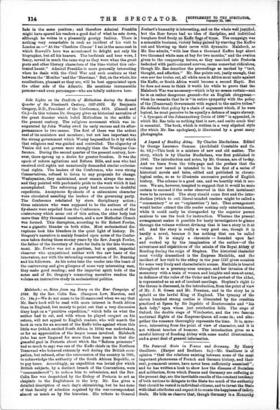Malaboch ; or, Notes from my Diary on the Boer
Campaign of 1894. By the Rev. Colin Rae. (Sampson Low, Marston, and Co. 143.)—We do not mean to be ill-mannered when we say that Mr. Rae's book will be read with more interest in South Africa than in England, but merely to point out that a very discursive diary kept on a "punitive expedition," which tells us what the author had to eat, and with whom he played croquet on his return, will not appeal to English readers, who will search the book in vain for an account of the Kaffir tribe against whom this little war (which excited South Africa in 1894) was undertaken, or for an appreciation of the larger issues involved. Malaboch (who has now lingered for more than four years in that dis- graceful gaol in Pretoria about which the "Reform prisoners" had so much to say) was one of the Kaffir chiefs in the Northern Transvaal who behaved extremely well during the British occu- pation, but refused, after the retrocession of the country in 1881, to acknowledge the authority of the South African Republic, or to pay taxes. Accordingly, an expedition was levied (for which British subjects, by a distinct breach of the Conventions, were "commandeered ") to reduce him to submission, and the Rev. Colin Rae was despatched by the Bishop of Pretoria to act as chaplain to the Englishmen in the levy. Mr. Rae gives a detailed description of each day's skirmishing, but he has none of that faculty of selection required by the war-correspondent almost as much as by the historian. His tribute to General ionbert's humanity is interesting, and on the whole well justified, but the Boer forces had no idea of discipline, and individual burghers fired freely on Kaffir flags of truse; The campaign was a martrable business, victory being gained by starving the K.affire out and blowing up their caves with dynamite. Malaboch, as Mr. Rae admits, "with less than a thousand Kaffirs kept about two thousand white men at bay for two months," and the ovation given to the conquering heroes, as they marched into Pretoria bedecked with parti-coloured scarves, seems somewhat ridiculous, though Mr. Rae describes the proceedings as marked by "tact, thought, and affection." Mr. Rae points out, justly enough, that once war has broken out, all white men in Africa must unite against the Kaffir, or South Africa would become a second Hayti. But he does not seem to think it worth his while to prove that the Malaboch War was necessary—which is by no means certain—and he is on rather dangerous ground—for an English clergyman— when he remarks that he is "in entire sympathy with the policy of the (Transvaal) Government with regard to the native tribes." He defends that policy by a chain of argument which, if he were logical, he must perceive to be equally a defence of negro slavery. "A Synopsis of the Johannesburg Crisis of 1896" is appended, in which Mr. Rae tells us nothing that is new, and omits much that is essential. The book, which is written in a very slipshod style (for which Mr. Rae apologises), is illustrated by a great many photographs.


















































 Previous page
Previous page